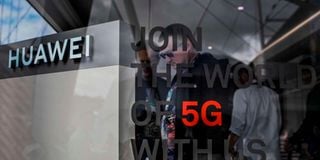Huawei ‘ignoring’ concerns as African governments use its tech to censor citizens

People visit the stand of Chinese telecom giant Huawei during the Web Summit in Lisbon on November 6, 2019.
Chinese tech giant Huawei may be ignoring concerns about intrusion in private lives and freedom of information in its dealings with African governments, researchers say.
In an interview with the press freedom lobby Committee to Protect Journalists, two tech researchers who authored an internet surveillance report said the Chinese giant owes users responsibility to protect them.
The researchers had found, in a report published in August, that up 18 countries, out of 72 surveyed, across the world, including Egypt, Nigeria, Burundi, South Africa and Senegal had deployed some form of internet censorship, targeting to tame crime, trafficking and violence.
Those countries used devices supplied by American and Chinese firms to examine packets of data that facilitates browsing and can filter information or divert visitors to rogue websites that could easily steal people’s personal information such as passwords.
In most cases, those devices known as middle boxes have been used to block harmful stuff such as where to buy drugs online, pornography, human trafficking or incitement. In Africa though, countries like Burundi were found to have installed Huawei’s technology to also block news websites and blogs deemed critical to the authorities.
Protect local citizens’ rights
In Burundi, the researchers detected that Huawei’s middlebox infrastructure was used to block websites such as radios Inzamba and Isanganiro, the news website Iwacu, and the African Public Radio website.
Valentin Weber, a PhD researcher who helped co-author the report, told CPJ that Huawei cannot avoid responsibility to protect local citizens’ rights even where it has obtained contracts to provide surveillance services.
“There are best practices to engage customers abroad and do risk assessments. I haven’t seen much evidence that Huawei does this,” Weber, a PhD candidate at the University of Oxford, told CPJ last week
“If you’re a manufacturer selling to law enforcement or government entities, you have to assess their human rights record. It’s too easy to say, ‘We don’t know how it’s going to be used.’ We were able to find questionable use of the technology, a multi-million or multi-billion-dollar company should be able to as well.”
Huawei is not the only company fingered for selling its tech services to rogue regimes. Blue Coast Systems, an American firm, had also been found to sell its services in violation of the duty of care. But Huawei’s prevalence in countries beyond Africa was seen as fuelled by its affordable gadgets which can be installed at a cheaper price compared to the Western suppliers.
The company did not issue a response to the researchers' report, but has in the past said it doesn't control which information clients can choose to filter. It has previously rejected accusations of spying but declined to discuss details of relationships with its clients.
Weber had back in August co-authored a report with aVasilis Ververis, also a PhD candidate at Humboldt University of Berlin for PrivacyCo, the firm that owns tech research website Top10VPN.com. They found that Huawei has deployed middleboxes used for tracking the internet in 72 countries to manage traffic, security, internet safety and as well as other online vices.
But they also found that some of the blocks imposed in those countries amounted to human rights violations, such as when websites for news are blocked from local access.
Censor dating sites
Some of the gadgets retained data, especially when doing online shopping or tracked the behavior of users especially on social media platforms. They said they detected Huawei gadgets through the metadata received from web servers.
“It’s actually quite surprising that [so many countries] use the same device, so there may be more to unpack there – whether it’s cheap, or easy to deploy, we don’t know,” said Ververis.
Usually, vendors sell licences to use their services which means they have to maintain the systems for their clients.
In countries like Egypt, Huawei middleboxes were used to censor personal dating sites, information on political advocacy and LGBTQ. In South Africa, they censor racial profiling or incitement. In Burundi, bloggers were targeted as was Nigeria. Overall, news sites and political advocacy websites were blocked more times than anything else.
“The research is not conclusive, but our goal was to raise awareness. If one vendor and one device can do so much damage, what happens with the other dozens or even hundreds that are also out there?”
The researchers say there should be more due diligence on Huawei and other Chinese tech firms as a massive amount of information has been transmitted through their platforms.




